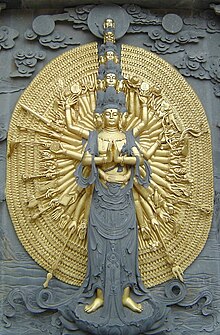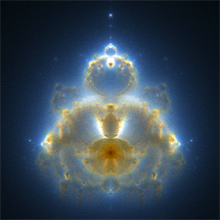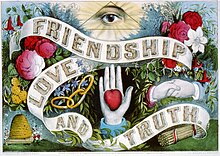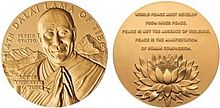Tenzin Gyatso, 14th Dalai Lama

His Holiness, Tenzin Gyatso, the 14th Dalai Lama (born 6 July 1935). Head of state and spiritual leader of the people of Tibet; Awarded the 1989 Nobel Peace Prize; born Lhamo Dhondrub, renamed Jetsun Jamphel Ngawang Lobsang Yeshe Tenzin Gyatso (Holy Lord, Gentle Glory, Compassionate, Defender of the Faith, Ocean of Wisdom) upon being officially recognized as the Dalai Lama. Tibetans often refer to him as Yeshe Norbu, the "Wishfulfilling Gem" or just Kundun - "The Presence."
Quotes[edit]



- From my own limited experience I have found that the greatest degree of inner tranquility comes from the development of love and compassion. The more we care for the happiness of others, the greater our own sense of well-being becomes. Cultivating a close, warm-hearted feeling for others automatically puts the mind at ease. This helps remove whatever fears or insecurities we may have and gives us the strength to cope with any obstacles we encounter. It is the ultimate source of success in life.
- Ultimately, the reason why love and compassion bring the greatest happiness is simply that our nature cherishes them above all else. The need for love lies at the very foundation of human existence. It results from the profound interdependence we all share with one another.
- I believe that at every level of society - familial, tribal, national and international - the key to a happier and more successful world is the growth of compassion. We do not need to become religious, nor do we need to believe in an ideology. All that is necessary is for each of us to develop our good human qualities.
I try to treat whoever I meet as an old friend. This gives me a genuine feeling of happiness. It is the practice of compassion.
- My true religion is Kindness.
- Kindness, Clarity, and Insight (1984)
- Variant: My religion is very simple. My religion is kindness.
- As quoted in Tibet, a Guide to the Land of Fascination (1988) by Trilok Chandra Majupuria and Indra Majupuria.
- It is very important to generate a good attitude, a good heart, as much as possible. From this, happiness in both the short term and the long term for both yourself and others will come.
- Kindness, Clarity, and Insight (1984).
- It is very good to recite the mantra Om mani padme hum, but while you are doing it, you should be thinking on its meaning, for the meaning of the six syllables is great and vast. The first, Om is composed of three letters, A, U, and M. These symbolize the practitioner's impure body, speech, and mind; they also symbolize the pure exalted body, speech, and mind of a Buddha. Can impure body, speech, and mind be transformed into pure body, speech, and mind, or are they entirely separate? All Buddhas are cases of beings who were like ourselves and then in dependence on the path became enlightened; Buddhism does not assert that there is anyone who from the beginning is free from faults and possesses all good qualities. The development of pure body, speech, and mind comes from gradually leaving the impure states and their being transformed into the pure. How is this done? The path is indicated by the next four syllables.
- A Talk on OM MANI PADME HUM, Shambhala Publications, (Autumn 2002)
- There is a saying in Tibetan that “at the door of the miserable rich man sleeps the contented beggar”. The point of this saying is not that poverty is a virtue, but that happiness does not come with wealth, but from setting limits to one’s desires, and living within those limits with satisfaction.
- In Rubin, Gary (April 2013). Your Emotional Fitness: Everything You Need to Know to Live a Life of Abundance. Balboa Press. pp. 173–. ISBN 978-1-4525-7059-4..
- Religion does not mean just precepts, a temple, monastery, or other external signs, for these as well as hearing and thinking are subsidiary factors in taming the mind. When the mind becomes the practices, one is a practitioner of religion, and when the mind does not become the practices one is not.
- Deity Yoga (1987) ISBN 0937938505
- Great wealth can only be obtained through deception and corruption.
- 37 Practices of the Bodhisattva, teaching at Bodhgaya (January 1974).

- What is the Great Vehicle? What is the mode of procedure of the Bodhisattva path? We begin with the topic of the altruistic intention to achieve enlightenment in which one values others more than oneself. The Great Vehicle path requires the vast motivation of a Bodhisattva, who, not seeking just his or her welfare, takes on the burden of bringing about the welfare of all sentient beings. When a person generate this attitude, they enter within the Great Vehicle, and as long as it has not been generated, one cannot be counted among those of the Great Vehicle. This attitude really has great power; it, of course, is helpful for people practicing religion, but it also is helpful for those who are just concerned with the affairs of this lifetime. The root of happiness is altruism — the wish to be of service to others.
- The Dalai Lama at Harvard: Lectures on the Buddhist Path to Peace (1988) by Jeffrey Hopkins.
- I feel that the essence of spiritual practice is your attitude toward others. When you have a pure, sincere motivation, then you have right attitude toward others based on kindness, compassion, love and respect. Practice brings the clear realisation of the oneness of all human beings and the importance of others benefiting by your actions.
- Answering the question "Your Holiness, there are many people in the West who want to combine their spiritual practice with social and political responsibility. Do you feel that these two aspects are connected?" in an interview with Catherine Ingram, Dharamsala, India (2 November 1988).

- It is the enemy who can truly teach us to practice the virtues of compassion and tolerance.
- Ocean of Wisdom: Guidelines for Living (1989) ISBN 094066609X
- Unsourced variant: In the practice of tolerance, one's enemy is the best teacher.
- I am a simple Buddhist monk — no more, no less.
- As quoted in Nobel Prize Winners (1991) by Lisa F. Dewitt.
- Dr. Rajendra Prasad was a true Bodhisatva. His humility brought tears to my eyes.
- Freedom in Exile: The Autobiography of the Dalai Lama (1991).
- Thousands — millions and billions — of animals are killed for food. That is very sad. We human beings can live without meat, especially in our modern world. We have a great variety of vegetables and other supplementary foods, so we have the capacity and the responsibility to save billions of lives. I have seen many individuals and groups promoting animal rights and following a vegetarian diet. This is excellent. Certain killing is purely a "luxury." … But perhaps the saddest is factory farming. The poor animals there really suffer. I once visited a poultry farm in Japan where they keep 200,000 hens for two years just for their eggs. During those two years, they are prisoners. Then after two years, when they are no longer productive, the hens are sold. That is really shocking, really sad. We must support those who are attempting to reduce that kind of unfair treatment. An Indian friend told me that his young daughter has been arguing with him that it is better to serve one cow to ten people than to serve chicken or other small animals, since more lives would be involved. In the Indian tradition, beef is always avoided, but I think there is some logic to her argument. Shrimp, for example, are very small. For one plate, many lives must be sacrificed. To me, this is not at all delicious. I find it really awful, and I think it is better to avoid these things. If your body needs meat, it may be better to eat bigger animals. Eventually you may be able to eliminate the need for meat. I think that our basic nature as human beings is to be vegetarian — making every effort not to harm other living beings. If we apply our intelligence, we can create a sound, nutritional program. It is very dangerous to ignore the suffering of any sentient being.
- Interview in Worlds in Harmony: Dialogues on Compassionate Action, Berkeley: Parallax Press, 1992, pp. 20-21.

- Don't compare me with Jesus. He is a great master, a great master...
- Interview in The New York Times (28 November 1993).
- I believe that in the 20th century, humanity has learned from many, many experiences. Some positive, and many negative. What misery, what destruction! The greatest number of human beings were killed in the two world wars of this century. But human nature is such that when we face a tremendous critical situation, the human mind can wake up and find some other alternative. That is a human capacity.
- Interview in The New York Times (28 November 1993).
- Reason well from the beginning and then there will never be any need to look back with confusion and doubt.
- The Path to Enlightenment (1994) ISBN 1559390328
- Human happiness and human satisfaction must ultimately come from within oneself. It is wrong to expect some final satisfaction to come from money or from a computer.
- The Path to Tranquility: Daily Wisdom (1998) edited by Renuka Singh
- Bodhicitta is the medicine which revives and gives life to every sentient being who even hears of it. When you engage in fulfilling the needs of others, your own needs are fulfilled as a by-product.
- The Path to Tranquility: Daily Wisdom (1998) edited by Renuka Singh
- It is also possible within this lifetime to enhance the power of the mind, enabling one to reaccess memories from previous lives. Such recollection tends to be more accessible during meditative experiences in the dream state. Once one has accessed memories of previous lives in the dream state, one gradually recalls them in the waking state.
- Consciousness at the Crossroads: Conversations with The Dalai Lama on Brain Science and Buddhism (1999) ISBN 1559391278
- If there is love, there is hope that one may have real families, real brotherhood, real equanimity, real peace. If the love within your mind is lost and you see other beings as enemies, then no matter how much knowledge or education or material comfort you have, only suffering and confusion will ensue
- The Little Book of Buddhism (2000) ISBN 0712602402
- If you want others to be happy, practice compassion. If you want to be happy, practice compassion.
- As quoted in Meditations for Living In Balance: Daily Solutions for People Who Do Too Much (2000) by Anne Wilson Schaef, p. 11.
- Within the body there are billions of different particles. Similarly, there are many different thoughts and a variety of states of mind. It is wise to take a close look into the world of your mind and to make the distinction between beneficial and harmful states of mind. Once you can recognize the value of good states of mind, you can increase or foster them.
- The Dalai Lama's Book of Wisdom (2000).

- Compassion without attachment is possible. Therefore, we need to clarify the distinctions between compassion and attachment. True compassion is not just an emotional response but a firm commitment founded on reason. Therefore, a truly compassionate attitude towards others does not change even if they behave negatively. Genuine compassion is based not on our own projections and expectations, but rather on the needs of the other...
- The Compassionate Life (2001), Ch. 2 "How to Develop Compassion" p. 21

- From the moment of birth every human being wants happiness and freedom and wants to avoid suffering. In this we are all the same; and the more we care for the happiness of others the greater our own sense of each other becomes. Many of our problems are created by ourselves based on divisions due to ideology, religion, race, resources, economic status or other factors. The time has come to think on a deeper, more human level and appreciate and respect our sameness as human beings. And to have a respect for endangered cultures that share these principles. We are at the dawn of an age in which many people feel that extreme political concepts should cease to dominate human affairs. We should use this opportunity to replace them with universal human and spiritual values and ensure that these values become the fiber of the global family that is emerging. It is not possible to find peace with anger, hatred, jealousy or greed. At every level of society, familial, tribal, national and international, the key to a happier and more peaceful and successful world is the growth of compassion. We do not necessarily need to become religious, nor even believe in an ideology. We need only to develop our good human qualities and know that love and compassion are the most essential concepts for human survival. So long as human beings live and suffer, the only world open to our present knowledge, the brotherhood of man will seem an unattainable principle. In order for us to achieve real lasting peace among one another, the effort to realize that noblest and most satisfactory moral value must be occupation of every individual intelligence.
- The Compassionate Life (2001) Ch. 3 "Global Compassion".
- According to Buddhism, individuals are masters of their own destiny. And all living beings are believed to possess the nature of the Primordial Buddha Samantabhadra, the potential or seed of enlightenment, within them. So our future is in our own hands. What greater free will do we need?
- Answering the question: "Do sentient beings have free will?" in Dzogchen : The Heart Essence of the Great Perfection (2001), p. 168, ISBN 155939157X.

- We need a little more compassion, and if we cannot have it then no politician or even a magician can save the planet.
- As quoted in Words Of Wisdom: Selected Quotes by His Holiness the Dalai Lama (2001) edited by Margaret Gee, p. 49.
- Compassion and tolerance are not a sign of weakness, but a sign of strength.
- As quoted in Words Of Wisdom: Selected Quotes by His Holiness the Dalai Lama (2001) edited by Margaret Gee, p. 71.
- In non-theistic traditions, such as Buddhism, everything is due to its own causes. Karma may come from this lifetime, but it may even come from previous lifetimes. From the Buddhist point of view, we must make forceful positive karma, which can be stronger than the previous negative karma. This can reduce or even eliminate the previous negative karma. So look forward. Lead some kind of new life, full of determination. Lead your life in an honest way, a truthful way. By truthful acts, by compassionate acts, increase positive karma.
- As quoted in The Transformation of Pain (5 November 2011)
- Each of us has the potential to contribute … You have a great opportunity to make a new shape of the world.
- Conflicts do not arise out of the blue. They occur as a result of causes and conditions, many of which are within the antagonists’ control. This is where leadership is important. Terrorism cannot be overcome by the use of force because it does not address the underlying problems. In fact the use of force may not only fail to solve the problems, it may exacerbate them, and frequently leaves destruction and suffering in its wake.
- Dalai Lama in his “Commemoration of the First Anniversary of September 11, 2001
- Love and compassion are necessities, not luxuries. Without them humanity cannot survive.
- As quoted in A Small Drop of Ink: A Collection of Inspirational and Moving Quotations of the Ages (2003) by Linda Pendleton.
- Through violence, you may 'solve' one problem, but you sow the seeds for another.
...
One has to try to develop one's inner feelings, which can be done simply by training one's mind. This is a priceless human asset and one you don't have to pay income tax on!
...
First one must change. I first watch myself, check myself, then expect changes from others.
...
Love and compassion are necessities, not luxuries. Without them, humanity cannot survive.
...
I myself feel, and also tell other Buddhists that the question of Nirvana will come later.
There is not much hurry.
If in day to day life you lead a good life, honesty, with love,
with compassion, with less selfishness,
then automatically it will lead to Nirvana.
...
The universe that we inhabit and our shared perception of it are the results of a common karma. Likewise, the places that we will experience in future rebirths will be the outcome of the karma that we share with the other beings living there. The actions of each of us, human or nonhuman, have contributed to the world in which we live. We all have a common responsibility for our world and are connected with everything in it.
...
If the love within your mind is lost and you see other beings as enemies, then no matter how much knowledge or education or material comfort you have, only suffering and confusion will ensue.
...
It is under the greatest adversity that there exists the greatest potential for doing good, both for oneself and others.
...
Whenever Buddhism has taken root in a new land, there has been a certain variation in the style in which it is observed. The Buddha himself taught differently according to the place, the occasion and the situation of those who were listening to him.
...
Samsara - our conditioned existence in the perpetual cycle of habitual tendencies and nirvana - genuine freedom from such an existence- are nothing but different manifestations of a basic continuum. So this continuity of consciousness us always present. This is the meaning of tantra.
...
According to Buddhist practice, there are three stages or steps. The initial stage is to reduce attachment towards life.
The second stage is the elimination of desire and attachment to this samsara. Then in the third stage, self-cherishing is eliminated.
...
The creatures that inhabit this earth-be they human beings or animals-are here to contribute, each in its own particular way, to the beauty and prosperity of the world.
...
To develop genuine devotion, you must know the meaning of teachings. The main emphasis in Buddhism is to transform the mind, and this transformation depends upon meditation. in order to meditate correctly, you must have knowledge.
...
Anything that contradicts experience and logic should be abandoned.
...
The ultimate authority must always rest with the individual's own reason and critical analysis.
...
From one point of view we can say that we have human bodies and are practicing the Buddha's teachings and are thus much better than insects. But we can also say that insects are innocent and free from guile, where as we often lie and misrepresent ourselves in devious ways in order to achieve our ends or better ourselves. From this perspective, we are much worse than insects.
...
When the days become longer and there is more sunshine, the grass becomes fresh and, consequently, we feel very happy. On the other hand, in autumn, one leaf falls down and another leaf falls down. The beautiful plants become as if dead and we do not feel very happy. Why? I think it is because deep down our human nature likes construction, and does not like destruction. Naturally, every action which is destructive is against human nature. Constructiveness is the human way. Therefore, I think that in terms of basic human feeling, violence is not good. Non-violence is the only way.
...
We humans have existed in our present form for about a hundred thousand years. I believe that if during this time the human mind had been primarily controlled by anger and hatred, our overall population would have decreased. But today, despite all our wars, we find that the human population is greater than ever. This clearly indicates to me that love and compassion predominate in the world. And this is why unpleasant events are "news"; compassionate activities are so much a part of daily life that they are taken for granted and , therefore, largely ignored.
...
The fundamental philosophical principle of Buddhism is that all our suffering comes about as a result of an undisciplined mind, and this untamed mind itself comes about because of ignorance and negative emotions. For the Buddhist practitioner then, regardless of whether he or she follows the approach of the Fundamental Vehicle, Mahayana or Vajrayana, negative emotions are always the true enemy, a factor that has to be overcome and eliminated. And it is only by applying methods for training the mind that these negative emotions can be dispelled and eliminated. This is why in Buddhist writings and teachings we find such an extensive explanation of the mind and its different processes and functions. Since these negative emotions are states of mind, the method or technique for overcoming them must be developed from within. There is no alternative. They cannot be removed by some external technique, like a surgical operation."- Dzogchen: The Heart Essence of the Great Perfection, Snow Lion Publications, Ithaca, 2004
- My confidence in venturing into science lies in my basic belief that as in science so in Buddhism, understanding the nature of reality is pursued by means of critical investigation: if scientific analysis were conclusively to demonstrate certain claims in Buddhism to be false, then we must accept the findings of science and abandon those claims.
- The Universe in a Single Atom: The Convergence of Science and Spirituality (2005).
- If science proves some belief of Buddhism wrong, then Buddhism will have to change. In my view, science and Buddhism share a search for the truth and for understanding reality. By learning from science about aspects of reality where its understanding may be more advanced, I believe that Buddhism enriches its own worldview.
- The New York Times (12 November 2005).

- All major religious traditions carry basically the same message, that is love, compassion and forgiveness … the important thing is they should be part of our daily lives.
- As quoted in Especially for Christians: Powerful Thought-provoking Words from the Past (2005) by Mark Alton Rose, p. 19
- [Tibetan Buddhism is] not just for Tibetans: it can do good for billions of people in our modern world.
- The Tibetan state is located between two of the world's great powers, India and China. Good relations between these powers are crucial for world peace. Tibet has an important role to play.

- His Holiness Pope John Paul II was a man I held in high regard. His experience in Poland and my own difficulties with communists gave us an immediate ground.
The Pope was very sympathetic to the Tibetan problem. Of course, as the head of an institution trying to establish good relations with China and seriously concerned about the status of millions of Christians in China he could not express this publicly or officially. But right from the start of our friendship he revealed to me privately that he had a clear understanding of the Tibetan problem because of his own experience of communism in Poland. This gave me great personal encouragement.
- Media people should have long noses like an elephant to smell out politicians, mayors, prime ministers and businessmen. We need to know the reality, the good and the bad, not just the appearance.
- News conference in Vancouver, B.C. as quoted in The Globe and Mail. (8 September 2006).
- The time has come to educate people, to cease all quarrels in the name of religion, culture, countries, different political or economic systems. Fighting is useless. Suicide.
- News conference in Vancouver, B.C. as quoted in The Globe and Mail. (8 September 2006).
- If a woman reveals herself as more useful the lama could very well be reincarnated in this form.
- News conference in Italy, as quoted in "Dalai Lama says successor could be a woman" in Telegraph (07 Dec 2007)
- Forgiveness doesn't mean forget what happened. … If something is serious and it is necessary to take counter-measures, you have to take counter-measures.
- On the killing of al-Queda terrorist leader Osama bin Laden by US military forces, as quoted in "Dalai Lama suggests Osama bin Laden's death was justified" by Mitchell Landsberg, in The Los Angeles Times (4 May 2011).
- When we look into the face of every single refugee, especially the children and women, we can feel their suffering. A human being who is a bit more fortunate has the duty to help them. On the other hand, there are too many now. Europe, for example Germany, cannot become an Arab country. Germany is Germany. There are so many that in practice it becomes difficult. [F]rom a moral point of view too, I think that the refugees should only be admitted temporarily. The goal should be that they return and help rebuild their countries.
- As quoted in "Dalai Lama says 'too many' refugees in Europe", The Times of India (31 May 2016)
- It’s important that, as we begin the New Year, look forward... We should project our intention ahead, so that we make this year a meaningful one.... When you look back… how would you think about the year that you have spent? Would you have a sense of contentment, saying that ‘I have lived that year well. I have served the purpose of that year.’? Or would you be looking back with a sense of regret for all the troubles you have caused?... If an individual were to make conscious intention to live his or her life with a sense of purpose, live it in a good way, then the ripple effect of that really spreads. First, from the individual to the family, then to the community… and so on. This is how society gets changed and effected.
- I think Europe belongs to the Europeans
- Quoted in Dalai Lama says 'Europe belongs to Europeans', Business Times, Singapore 13 September 2018
- Time is always moving on; nothing can stop it. We can’t change the past, but we can shape the future. The more compassionate you are, the more you will find inner peace.
- Official twitter page of the Office of His Holiness the 14th Dalai Lama. Tweet from 8. April 2019 11:30 am. Archived from the original on March 10, 2022 and January 9, 2024.
- According to today’s reality, thinking in terms of ‘my self, my family, my nation’ has become unrealistic. An individual’s future is now linked to the entire humanity and planet, to a happier humanity and a healthier world... it’s an encouraging sign that young people like Thunberg are genuinely concerned for the future of the planet.... Eventually Tibet may become a desert, some scientists say.
- Dalai Lama, Thunberg interaction: ‘Need to educate ourselves on global processes linked to climate crisis’, The Indian Express, report on the livestream event. (10 January 2021)
- first here, then I think finally here also. And suck my tongue
- February 2023 speaking to young boy in Dharamshala, reported 10 April 2023 by CNN in Dalai Lama apologizes after video asking child to ‘suck’ his tongue sparks outcry
Letter to Deng Xiaoping (1981)[edit]
- Letter to Deng Xiaoping (23 March 1981) Full text online

- I agree with and believe in the Communist ideology which seeks the well being of human beings in general and the proletariat in particular, and in Lenin's policy of the equality of nationalities. Similarly, I was pleased with the discussions I had with Chairman Mao on ideology and the policy towards nationalities.
If that same ideology and policy were implemented it would have brought much admiration and happiness. However, if one is to make a general comment on the developments during the past two decades, there has been a lapse in economic and educational progress, the basis of human happiness. Moreover, on account of the hardships caused by the unbearable disruptions, there has been a loss of trust between the Party and the masses, between the officials and the masses, among the officials themselves, and also among the masses themselves.
By deceiving one another through false assumptions and misrepresentations there has been, in reality, a great lapse and delay in achieving the real goals.
- It is regrettable that some Tibetan officials, who lack the wisdom and competence required for promoting basic human happiness and the short and long term welfare of their own people, indulge in flattering Chinese officials and, collaborate with these Chinese officials who know nothing about Tibetans and work simply for their temporary fame indulging in fabricating impressive reports. In reality, the Tibetan people have not only undergone immeasurable sufferings, but large numbers have also unnecessarily lost their lives.
- On the political front, we have always pursued the path of truth and justice in our struggle for the legitimate rights of the Tibetan people. We have never indulged in distortions, exaggerations and criticism of the Chinese people. Neither have we harboured any ill will towards them. Above all, we have always held to our position of truth and justice without siding with any of the international political power blocks.
- We must improve the relationship between China and Tibet as well as between Tibetans in and outside Tibet. With truth and equality as our foundation, we must try to develop friendship between Tibetans and Chinese through better understanding in the future. The time has come to apply our common wisdom in a spirit of tolerance and broadmindedness to achieve genuine happiness for the Tibetan people with a sense of urgency.
On my part, I remain committed to contribute my efforts for the welfare of all human beings, and in particular the poor and the weak to the best of my ability without any distinction based on national boundaries.
Nobel acceptance speech (1989)[edit]
- Nobel acceptance speech (10 December 1989) Full text online

- I believe all suffering is caused by ignorance. People inflict pain on others in the selfish pursuit of their happiness or satisfaction. Yet true happiness comes from a sense of inner peace and contentment, which in turn must be achieved through the cultivation of altruism, of love and compassion and elimination of ignorance, selfishness and greed.
The problems we face today, violent conflicts, destruction of nature, poverty, hunger, and so on, are human-created problems which can be resolved through human effort, understanding and the development of a sense of brotherhood and sisterhood. We need to cultivate a universal responsibility for one another and the planet we share. Although I have found my own Buddhist religion helpful in generating love and compassion, even for those we consider our enemies, I am convinced that everyone can develop a good heart and a sense of universal responsibility with or without religion.

- With the ever-growing impact of science on our lives, religion and spirituality have a greater role to play by reminding us of our humanity. There is no contradiction between the two. Each gives us valuable insights into the other. Both science and the teachings of the Buddha tell us of the fundamental unity of all things. This understanding is crucial if we are to take positive and decisive action on the pressing global concern with the environment. I believe all religions pursue the same goals, that of cultivating human goodness and bringing happiness to all human beings. Though the means might appear different the ends are the same.
- As we enter the final decade of this century I am optimistic that the ancient values that have sustained mankind are today reaffirming themselves to prepare us for a kinder, happier twenty-first century.
I pray for all of us, oppressor and friend, that together we succeed in building a better world through human understanding and love, and that in doing so we may reduce the pain and suffering of all sentient beings.
Nobel lecture (1989)[edit]
- Nobel lecture (11 December 1989) Full text online

- When I meet people in different parts of the world, I am always reminded that we are all basically alike: we are all human beings. Maybe we have different clothes, our skin is of a different colour, or we speak different languages. That is on the surface. But basically, we are the same human beings. That is what binds us to each other. That is what makes it possible for us to understand each other and to develop friendship and closeness.
- Because we all share this small planet earth, we have to learn to live in harmony and peace with each other and with nature. That is not just a dream, but a necessity. We are dependent on each other in so many ways, that we can no longer live in isolated communities and ignore what is happening outside those communities, and we must share the good fortune that we enjoy.

- I speak not with a feeling of anger or hatred towards those who are responsible for the immense suffering of our people and the destruction of our land, homes and culture. They too are human beings who struggle to find happiness and deserve our compassion. I speak to inform you of the sad situation in my country today and of the aspirations of my people, because in our struggle for freedom, truth is the only weapon we possess.
- Today, we are truly a global family. What happens in one part of the world may affect us all. This, of course, is not only true of the negative things that happen, but is equally valid for the positive developments. We not only know what happens elsewhere, thanks to the extraordinary modern communications technology. We are also directly affected by events that occur far away.
- Our own security is enhanced when peace breaks out between warring parties in other continents.
But war or peace; the destruction or the protection of nature; the violation or promotion of human rights and democratic freedoms; poverty or material well-being; the lack of moral and spiritual values or their existence and development; and the breakdown or development of human understanding, are not isolated phenomena that can be analysed and tackled independently of one another. In fact, they are very much interrelated at all levels and need to be approached with that understanding.
- Peace can only last where human rights are respected, where the people are fed, and where individuals and nations are free. True peace with oneself and with the world around us can only be achieved through the development of mental peace.
- Inner peace is the key: if you have inner peace, the external problems do not affect your deep sense of peace and tranquility. In that state of mind you can deal with situations with calmness and reason, while keeping your inner happiness. That is very important. Without this inner peace, no matter how comfortable your life is materially, you may still be worried, disturbed or unhappy because of circumstances.
- Responsibility does not only lie with the leaders of our countries or with those who have been appointed or elected to do a particular job. It lies with each one of us individually.

- I am deeply touched by the sincere concern shown by so many people in this part of the world for the suffering of the people of Tibet. That is a source of hope not only for us Tibetans, but for all oppressed people.
- I would like to take this opportunity to explain the Zone of Ahimsa or peace sanctuary concept, which is the central element of the Five-Point Peace Plan. I am convinced that it is of great importance not only for Tibet, but for peace and stability in Asia.
It is my dream that the entire Tibetan plateau should become a free refuge where humanity and nature can live in peace and in harmonious balance.
- The following are key elements of the proposed Zone of Ahimsa:
- the entire Tibetan plateau would be demilitarised;
- the manufacture, testing, and stockpiling of nuclear weapons and other armaments on the Tibetan plateau would be prohibited;
- the Tibetan plateau would be transformed into the world's largest natural park or biosphere. Strict laws would be enforced to protect wildlife and plant life; the exploitation of natural resources would be carefully regulated so as not to damage relevant ecosystems; and a policy of sustainable development would be adopted in populated areas;
- the manufacture and use of nuclear power and other technologies which produce hazardous waste would be prohibited;
- national resources and policy would be directed towards the active promotion of peace and environmental protection. Organisations dedicated to the furtherance of peace and to the protection of all forms of life would find a hospitable home in Tibet;
- the establishment of international and regional organisations for the promotion and protection of human rights would be encouraged in Tibet.

- For the stability and peace of Asia, it is essential to create peace zones to separate the continent's biggest powers and potential adversaries.
- When I visited Costa Rica earlier this year, I saw how a country can develop successfully without an army, to become a stable democracy committed to peace and the protection of the natural environment. This confirmed my belief that my vision of Tibet in the future is a realistic plan, not merely a dream.
- I believe that our Tibetan ability to combine spiritual qualities with a realistic and practical attitude enables us to make a special contribution, in however modest a way. This is my hope and prayer.
In conclusion, let me share with you a short prayer which gives me great inspiration and determination:
- For as long as space endures,
And for as long as living beings remain,
Until then may I, too, abide
To dispel the misery of the world.- This last statement is a traditional form of the Bodhisattva vows.
- For as long as space endures,
The Dalai Lama: A Policy of Kindness (1990)[edit]

- The Dalai Lama, A Policy of Kindness: An Anthology by and about the Dalai Lama (1990) edited by Sidney Piburn ISBN 8120815122


- Old friends pass away, new friends appear. It is just like the days. An old day passes, a new day arrives. The important thing is to make it meaningful: a meaningful friend — or a meaningful day.
- As quoted in "Tibet's Living Buddha" by Pico Iyer, p. 32.
- Whether one believes in a religion or not, and whether one believes in rebirth or not, there isn't anyone who doesn't appreciate kindness and compassion.
- "Kindness and Compassion" p. 47.
- If I say, "I am a monk." or "I am a Buddhist," these are, in comparison to my nature as a human being, temporary. To be human is basic.
- "Kindness and Compassion" p. 47.
- Today we face many problems. Some are created essentially by ourselves based on divisions due to ideology, religion, race, economic status, or other factors. Therefore, the time has come for us to think on a deeper level, on the human level, and from that level we should appreciate and respect the sameness of others as human beings.
- "Kindness and Compassion" p. 47.
- This is my simple religion. There is no need for temples; no need for complicated philosophy. Our own brain, our own heart is our temple; the philosophy is kindness.
- "Kindness and Compassion" p. 52

- To study Buddhism and then use it as a weapon in order to criticize others' theories or ideologies is wrong. The very purpose of religion is to control yourself, not to criticize others. Rather, we must criticize ourselves. How much am I doing about my anger? About my attachment, about my hatred, about my pride, my jealousy? These are the things which we must check in daily life with the knowledge of the Buddhist teachings.
- "A Talk to Western Buddhists" p. 87.
- As Buddhists, while we practice our own teaching, we must respect other faiths, Christianity, Judaism and so forth. We must recognize and appreciate their contributions over many past centuries to human society, and at this time we must strive to make common effort to serve humankind.
- "A Talk to Western Buddhists" p. 87.
- Sectarian feelings and criticism of other teachings or other sects is very bad, poisonous, and should be avoided.
- "A Talk to Western Buddhists" p. 87.
- It is necessary to help others, not only in our prayers, but in our daily lives. If we find we cannot help others, the least we can do is to desist from harming them.
- "A Talk to Western Buddhists" p. 89

- If there are sound reasons or bases for the points you demand, then there is no need for violence. On the other hand, when there is no sound reason that concessions should be made to you but mainly your own desire, then reason cannot work and you have to rely on force. Thus using force is not a sign of strength but rather a sign of weakness.
- "The Nobel Evening Address" p. 115.
- As a result of more contact with people from other traditions, as time passes I have firmed my conviction that all religions can work together despite fundamental differences in philosophy. Every religion aims at serving humanity. Therefore, it is possible for the various religions to work together to serve humanity and contribute to world peace. So, during these last few years, at every opportunity I try to develop closer relations with other religions.
- "The Nobel Evening Address" p. 115.
- Buddhism does not accept a theory of God, or a creator. According to Buddhism, one's own actions are the creator, ultimately. Some people say that, from a certain angle, Buddhism is not a religion but rather a science of mind. Religion has much involvement with faith. Sometimes it seems that there is quite a distance between a way of thinking based on faith and one entirely based on experiment, remaining skeptical. Unless you find something through investigation, you do not want to accept it as fact. From one viewpoint, Buddhism is a religion, from another viewpoint Buddhism is a science of mind and not a religion. Buddhism can be a bridge between these two sides. Therefore, with this conviction I try to have closer ties with scientists, mainly in the fields of cosmology, psychology, neurobiology and physics. In these fields there are insights to share, and to a certain extent we can work together.
- "The Nobel Evening Address" p. 115.
Daily Telegraph interview (2006)[edit]

- Some say I am a good person, some say I am a charlatan — I am just a monk... I never asked people like Richard Gere to come, but it is foolish to stop them. I have Tibetans, Indians, backpackers, AIDS patients, religious people, politicians, actors and princesses. My attitude is to give everyone some of my time. If I can contribute in any way to their happiness, that makes me happy.
- I don't want to convert people to Buddhism — all major religions, when understood properly, have the same potential for good.
- Fundamentalism is terrifying because it is based purely on emotion, rather than intelligence. It prevents followers from thinking as individuals and about the good of the world.
A Call for Revolution (2017-2018)[edit]
Google Books preview, Rider (UK); William Morrow (US) (2018).
- My dear young friends … I believe in you. I have grown increasingly convinced that your generation has the capacity to transform the dawning century into an era of peace and dialogue. You have the means of reconciling our fractured humanity with itself and with the natural world.… You are the first generation of truly global citizens. The problems that you face today were not created by you. My generation and that of your parents … are the problem generations. You must be the solution finding generation! Make good use of collective intelligence, based on sharing. And above all be the generation that acts. You have the capacity to lead humanity towards a renewed form of fraternity, justice and solidarity….
- Humanity is entirely responsible for being at the root of the problems arising from global warming. We need to rethink the way we live on earth in order to preserve life. Global warming is out of control…. Time is not on our side, which is why I am calling on all young millennials to hasten this radical revolution. You are a part of nature and compassion decrees that you take care of it as much as you do yourselves. It is only through mutual support and co-operation that you will be able to contain disasters that are fuelled by economic and social injustice and are fuelled by greed, selfishness, and other negative states of mind…. You are responsible for the wellbeing of billions of humans and all manner of living species sharing the adventure of life on earth. It is up to you to protect natural resources and guard over air, water, oceans, forests, fauna and flora. To do so it is essential that you realize your potential for love and compassion in order to care for the earth. Learn to love it through sharing it rather than striving to possess it and thereby destroying it.
Misattributed[edit]
"What surprises you most about humanity?"[edit]
Often attributed to the Dalai Lama, or as author shanx dee, this appears to be a loose adaptation of the work of Jim Brown, published by Reata Strickland as An Interview with God ISBN 0743229576.
- "Man…. Because he sacrifices his health in order to make money. Then he sacrifices money to recuperate his health. And then he is so anxious about the future that he does not enjoy the present; the result being that he does not live in the present or the future; he lives as if he is never going to die, and then dies having never really lived."
Original text:
- "What surprises you most about mankind?"
- God answered:
- "That they get bored of being children, are in a rush to grow up, and then long to be children again. That they lose their health to make money and then lose their money to restore their health. That by thinking anxiously about the future, they forget the present, such that they live neither for the present nor the future. That they live as if they will never die, and they die as if they had never lived."
Successful people[edit]
- "The planet does not need more successful people. The planet desperately needs more peacemakers, healers, restorers, storytellers, and lovers of all kinds." -- Facebook image meme
Original:
- "The plain fact is that the planet does not need more successful people. But it does desperately need more peacemakers, healers, restorers, storytellers, and lovers of every kind. It needs people who live well in their places. It needs people of moral courage willing to join the fight to make the world habitable and humane. And these qualities have little to do with success as our culture has defined it." -- David W. Orr, Earth in Mind: On Education, Environment, and the Human Prospect ISBN 1559632941
Disputed[edit]
- If you think you are too small to make a difference, you have never been in bed with a mosquito
- The earliest known example of this quote comes from a January 1993 article in Time magazine, where it is associated with British businesswoman Anita Roddick:[1]: "Even Body Shop trucks are employed as rolling billboards for pithy slogans. Roddick's later favorite, taken from the side of one of her company's lorries, was: IF YOU THINK YOU'RE TOO SMALL TO HAVE AN IMPACT, TRY GOING TO BED WITH A MOSQUITO".
- IN the 21st century, it was cited as an "African proverb".[2] Earliest attribution to Dalai Lama is from 2004.[3]
Quotes about the 14th Dalai Lama[edit]


- The Dalai Lama said acts of violence should be remembered, and then forgiveness should be extended to the perpetrators.
But if someone has a gun and is trying to kill you, he said, it would be reasonable to shoot back with your own gun. Not at the head, where a fatal wound might result. But at some other body part, such as a leg.- Hal Bernton, reporting on remarks made during a public discussion with regional high school students in Portland, Oregon, in "Dalai Lama urges students to shape world" in The Seattle Times (15 May 2001).
- The Dalai Lama in his struggle for the liberation of Tibet consistently has opposed the use of violence. He has instead advocated peaceful solutions based upon tolerance and mutual respect in order to preserve the historical and cultural heritage of his people.
The Dalai Lama has developed his philosophy of peace from a great reverence for all things living and upon the concept of universal responsibility embracing all mankind as well as nature.
- The world has shrunk. Increasingly peoples and nations have grown dependent on one another. No one can any longer act entirely in his own interest. It is therefore imperative that we should accept mutual responsibility for all political, economic, and ecological problems.
In view of this, fewer and fewer people would venture to dismiss the Dalai Lama's philosophy as utopian: on the contrary, one would be increasingly justified in asserting that his gospel of nonviolence is the truly realistic one, with most promise for the future. And this applies not only to Tibet but to each and every conflict. The future hopes of oppressed millions are today linked to the unarmed battalions, for they will win the peace: the justice of their demands, moreover, is now so clear and the normal strength of their struggle so indomitable that they can only temporarily be halted by force of arms.
In awarding the Peace Prize to H.H. the Dalai Lama we affirm our unstinting support for his work for peace, and for the unarmed masses on the march in many lands for liberty, peace and human dignity.
- I don't think China will negotiate. I think they are waiting for the Dalai Lama to die... The Chinese government feels he symbolizes the entire independence movement, and when he is gone, it will go away.
- Tenzin Choegyal, brother of Tenzin Gyatzo, in "The Private Dalai Lama" by Ron Gluckman, in AsiaWeek magazine (10 May 1996).
- You know, in 1968 I interviewed an extraordinary man. The most peaceful man, the most gentle, the most tolerant, wise man, than I've ever known... So I interrupted him and I asked him: "Your Holiness, will you ever forgive your enemies?" He looked at me in amazement. Surprised, perhaps offended, stunned. And with that beautiful, fresh, ringing voice, he exclaimed: "Enemies? But I've never considered them enemies! I have no enemies! A Buddhist has no enemies".
- Oriana Fallaci. The Rage and The Pride (2002)
- There's no question that His Holiness is my root guru, and he's been quite tough with me at times. I've had to explain to people who sometimes have quite a romantic vision of His Holiness that at times he's been cross with me, but it was very skillful. At the moment he did it, I'm not saying it was pleasant for me, but there was no ego attachment from his side. I'm very thankful that he trusts me enough to be the mirror for me and not pull any punches. Mind you, the first meetings were not that way; I think he was aware how fragile I was and was being very careful. Now I think he senses that my seriousness about the teachings has increased and my own strength within the teachings has increased. He can be much tougher on me.
- I found also that the question of His Holiness in terms of a political movement was very tricky. It's a non-violent movement, which is a problem in itself-you don't get headlines with nonviolence. And His Holiness doesn't see himself as Gandhi; he doesn't create dramatic, operatic situations.
So we've ended up taking a much steadier kind of approach. It's not about drama. It's about, little by little, building truth, and I think it's probably been deeper because of that. The senators, congressmen, legislators and parliamentarians who have got involved go way beyond what they would normally give to a cause they believed in.- Richard Gere, in "My Journey as a Buddhist" an interview with Melvin McLeod in Shambhala Sun (May 1999).
- I think the universality of His Holiness' words and teachings have made this so much bigger than just Tibet. When His Holiness won the Nobel Peace Prize, there was a quantum leap. He is not seen as solely a Tibetan anymore; he belongs to the world.
- Richard Gere, in "My Journey as a Buddhist" an interview with Melvin McLeod in Shambhala Sun (May 1999).
- Maybe the Dalai Lama is the only person who is totally honest, and even with him, he's skillful not to hurt anybody. He's skillful.
- Richard Gere in "Interview - Unfaithful" by Rebecca Murray and Fred Tope.
- We used to say to the apartheid government... Come: join the winning side. His Holiness and the Tibetan people are on the winning side.
- I give great thanks to God that he has created a Dalai Lama. Do you really think, as some have argued, that God will be saying: 'You know, that guy, the Dalai Lama, is not bad. What a pity he's not a Christian?
- I heard the Dalai Lama say that a British physicist had told him, “Every nation should view every other nation as a domestic partner.” That one small shift in thinking changes everything.
- Marianne Williamson,Twitter (8 Jan 20)
Notes[edit]
- ↑ Philip Elmer-DeWitt, "Anita the Agitator", Time, 1993-01-25
- ↑ https://indianinthemachine.wordpress.com/2010/01/14/if-you-think-youre-too-small-to-make-a-difference-try-sleeping-in-a-closed-room-with-a-mosquito-african-proverb/
- ↑ https://books.google.com/books?id=K8Q53xW1ie8C&pg=PA1&dq=%22too+small+to+make+a+difference%22+mosquito+lama&hl=en&sa=X&ved=0ahUKEwjjxrTbkbnJAhVHLYgKHVfdB84Q6AEIIjAB#v=onepage&q=%22too%20small%20to%20make%20a%20difference%22%20mosquito%20lama&f=false
See also[edit]
External links[edit]
| Modern Buddhist writers 19th century to date | ||
| Theravada / Vipassana movement | B. R. Ambedkar • Ṭhānissaro Bhikkhu • Ajahn Chah • Anagarika Dharmapala • Joseph Goldstein • Henepola Gunaratana • Noah Levine • Nyanaponika Thera | |
| Mahayana | Daisaku Ikeda • Yin Shun • Alfred Bloom | |
| Vajrayana | Pema Chödrön • Kelsang Gyatso • Tenzin Gyatso • Matthieu Ricard • Robert Thurman • Chögyam Trungpa | |
| Zen | Taisen Deshimaru • Thích Nhất Hạnh • Philip Kapleau • D. T. Suzuki • Han Yong-un • Hsing Yun | |
| Other and Secular Buddhism | Stephen Batchelor • Robert Wright | |
| Scholars | Lokesh Chandra • Walter Evans-Wentz • Richard Gombrich • Thomas Rhys Davids | |
| Non-Buddhists influenced by Buddhism | Edwin Arnold • Helena Blavatsky • Fritjof Capra • Leonard Cohen • Alexandra David-Néel • Hermann Hesse • Carl Jung • Jon Kabat-Zinn • Friedrich Nietzsche • Henry Steel Olcott • Rajneesh • Helena Roerich • J. D. Salinger • Arthur Schopenhauer • Gary Snyder • Alan Watts • Alfred North Whitehead | |
- His Holiness the Dalai Lama at the Foundation for the Preservation of the Mahayana Tradition
- Tenzin Gyatso at the official Nobel Prize site.
- "Compassion and the Individual" by Tenzin Gyatso
- His Holiness the Dalai Lama at Tibet.com
- "XIVth Dalai Lama visits Harvard" (September 2003)
- "The Private Dalai Lama" by Ron Gluckman
- His Holiness the Dalai Lama at LamRim.com Tibetan Buddhist Internet Radio



